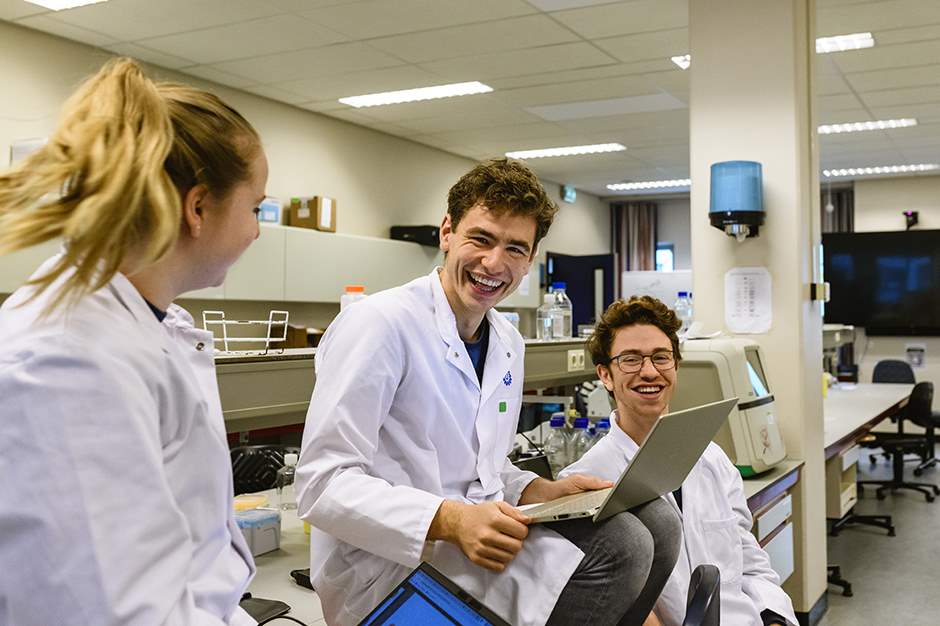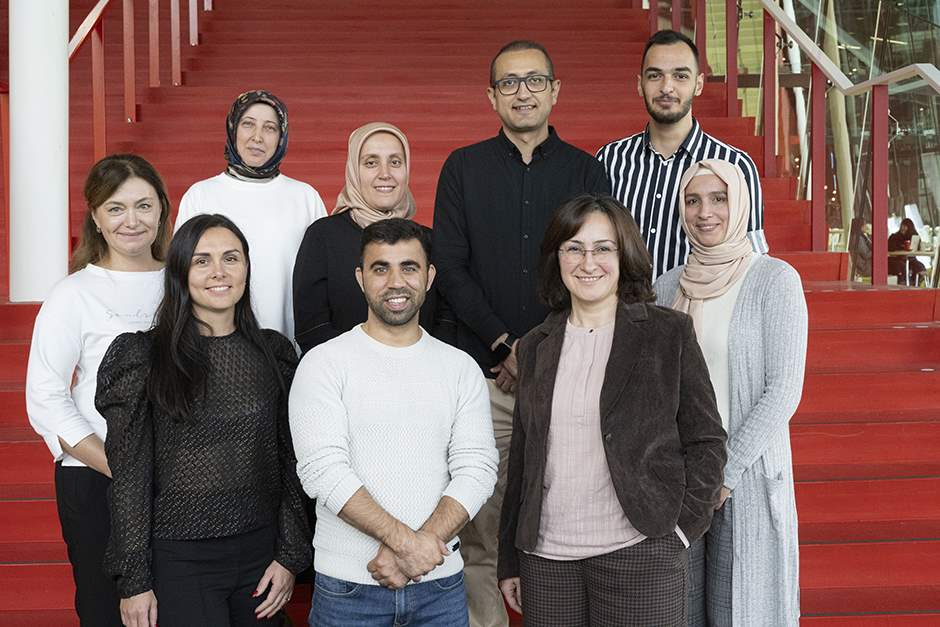People: our impact on students and society
To be able to study well and grow as a student, it is important that our students feel welcome, safe, respected, and appreciated. This is why we are focusing – now more than ever – on our students’ happiness and health (wellbeing). Numerous studies unfortunately show that students in healthcare score low on wellbeing. They experience a lot of stress, for example. Students would like to know how we address this. And what we are doing to make our education as diverse and inclusive as possible.

In 2024 we chose to include ‘wellbeing’ as a permanent component of our education. Current changes in the curriculum offer an ideal opportunity to make a focus on wellbeing a structural part of it. Students therefore no longer need to think about it in the small amount of free time that their full study program leaves them. We also appointed a Wellbeing Officer in 2024. This is a recent graduate who gathers input from our students on wellbeing.
New code of conduct for students, faculty, and supervisors
In our culture program, This is Us , we developed a new code of conduct for students, lecturers, and supervisors. This lets them know what is expected of them and also what each may expect from the other. It contributes to a safe environment where students and employees can perform well. And where they feel welcome, respected, and appreciated.
More workshops and training courses
If they feel a need for it, students can turn to several people for a listening ear and advice. Utrecht University also offers numerous workshops and training courses that help our students to find a proper balance between their studies, personal growth, and daily life, and to feel good about themselves. In 2024, the workshop and training offer was improved and expanded. In 2024 we also organized a number of workshops and training courses on wellbeing for PhD students and lecturers/tutors. And for the fourth time, we coordinated our KICK-start /NEW@UU program for new students. This is a one- or two-day program to prepare students properly for their academic and student life. They learn for instance how the social structures of the university work, what the unwritten rules are, and what is considered customary. Students indicated that the program gave them a better view of getting started with their new life at the university. All these activities contribute to letting students and PhDs feel more at ease and able to grow in the right way.
How do you ensure a learning environment where everyone feels heard and welcome?
We want all students to feel at home with us, and feel that they are seen and heard. To offer a safe, inclusive and supportive learning environment, we also collaborate with Utrecht University under the name Belonging@UU.
In 2024, for instance, we drew up the Belonging@UU Info Sheet. In it, lecturers and students can find useful information on how to make a safe and inclusive learning environment. We further developed an intervention in which senior students share their ‘feeling at home’ experiences in videos. New students thus feel that they are not alone in their challenges to feel at home, and develop a growth mindset and a sense of belonging. Students said that after the intervention they felt confident that what they were feeling was normal and that everything would work out fine. We also gave a workshop called ‘Supportive Classrooms@UU’ to lecturers in the Beta Sciences faculty. In it, lecturers learned how they could ensure a supportive learning environment. For example, they analyzed different practice cases to identify important components that contribute to a supportive and meaningful relationship for and with students.
“Students from second year and up shared their ‘feeling at home” experiences in videos. This made me confident that what I was feeling was normal and that everything would work out fine.

Does education at UMC Utrecht give equal opportunities to everyone, regardless of their origins or background?
With our education, we provide students and healthcare professionals in training with knowledge and expertise, regardless of their origins or background. We furthermore focus specifically on giving equal opportunities to everyone. In 2024 for instance, we organized a new education program to support newcomers.
More job-market opportunities for newcomers
As a region, we open our doors to people with a residence permit and increase their chances of learning or working in healthcare in the Netherlands. In 2024 we organized the new education program: ‘Orientation in Dutch Healthcare’ for residence-permit holders with a healthcare background who were not trained in the Netherlands. In this program, they get an extensive introduction to Dutch healthcare, including (medical) language. In 2024 there were two rounds of the education program. A total of 24 residence-permit holders took part. For 11 participants, the program has already been a success. Each has found a suitable job. These were participants with a variety of healthcare professions, such as obstetrician, (specialist) doctor, nurse, scrub nurse, and lab assistant. One from Afghanistan, Najibullah , for instance started working in our ENT department. Participation in the program increases newcomers’ chances on the job market. In this way we help to alleviate the shortage of healthcare professionals.
Najibullah, student: “I now have a job in my favorite department: ENT. Before this, I was stuck at home and had no contact with Dutch people. With this education program for newcomers I learned a lot about technical terms and the cultural differences in the Dutch healthcare system. It gave me more self-confidence and expanded my knowledge.”

How does UMC Utrecht ensure that students also learn from and work with other professional groups?
To teach students to collaborate with other professional groups, we are increasingly making inter-professional and interdisciplinary learning a part of our education. In 2024 for example, 400 students in Medicine and Biomedical Sciences got together for the annual multidisciplinary Health Challenge. Together, they worked on the question: how can we help as many children as possible who are suffering from a muscle disease? They came up with new ideas for the treatment and diagnosis of muscle diseases in children and elaborated these. It taught them to work together and make use of knowledge from other professional groups and thus have a direct impact on society.